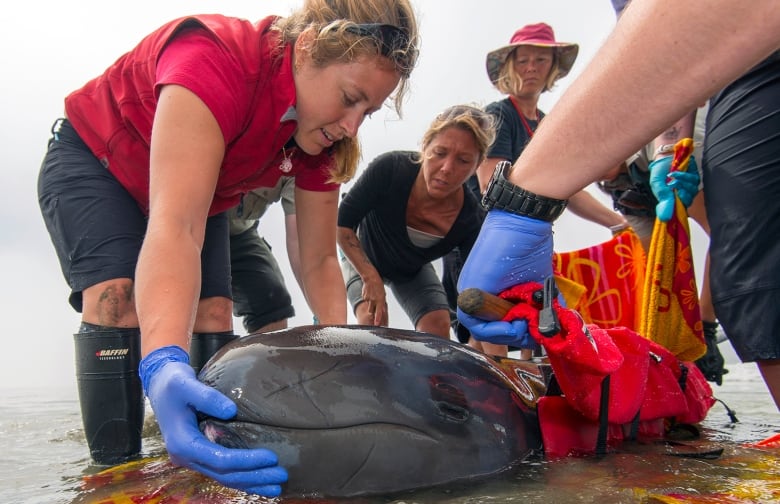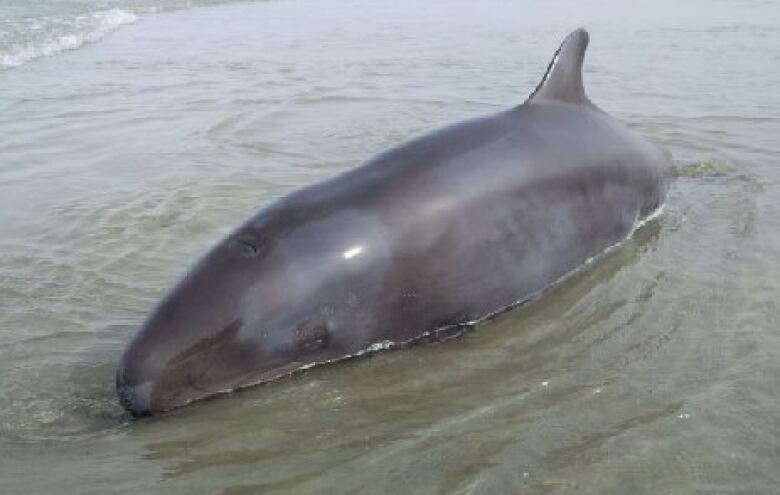False killer whale calf recovering at Vancouver rescue centre
Weeks old male calf was found stranded on Chesterman Beach in Tofino yesterday

A young false killer whale calf rescued on the west coast of Vancouver Island made it through the night, but the hard work of keeping it alive lies ahead, according to staff at the Vancouver Aquarium's Marine Mammal Rescue Centre.
The calf, which was originally thought to be a female, was found in poor condition Thursday morning on Tofino's North Chesterman Beach by locals.
As they fought to keep it alive, staff from the aquarium's rescue centre and the Department of Fisheries and Oceans were called out to try tosave it.

Despite the efforts, the calf was unable to swim on its own and staff decided to transport it to the rescue centre in Vancouver on Thursday night for rehabilitation.
Once at the rescue centre, staff in wetsuits spent the night with the calf in the rehab pools keeping it afloat. Staff then learned that the two-metre-long calfis a male.
Critical dips in heart rate, respiration
On Friday morning, the aquarium's head veterinarian, Martin Haulena,said there was a lot of hard work ahead to keep the calf alive.
"The transport went well, but he is in critical condition and there were some worrying dips in his heart rate and respiration last night," Haulenasaid in a statement released by the aquarium.
"We've started treatment and have conducted diagnostic tests. The hope is that he begins to recover and slowly gain weight."

The aquarium estimates the male calf is four to six weeks old. A statement said the animalis in "poor condition, with several lacerations and wounds along his body, likely from stranding."
"He is too weak to swim on his own.Members of the aquariums rescue team first held him in their arms in a pool,then transferred him to a specially designed floating sling that supports his weight.Treatment including fluids, antibiotics and formula designed just for marine mammals has already begun," the statement said.
"Hes very young.His teeth havent erupted, which indicates he was still nursing from his mother," Haulena said.
"Historically, stranded cetaceans have had a low chance of survival. Its always touch-and-go with young marine mammals who have become separated from their mothers, and rescuing a false killer whale is a new experience for us very few veterinarians and other professionals aroundtheworld have experience rehabilitating stranded false killer whale calves."
Aquarium controversy
The centre rescues stranded marine mammals and rehabilitates them for release into their natural habitat, but its connection with the Vancouver Aquarium makes it controversial.
Haulena said his focus was on saving the dolphin and not on the controversy surround the keeping of cetaceans in captivity.
False killer whales (Pseudorca crassidens) are a species of oceanic dolphins, which are distinct from the killer whale (Orcinus orca). They are only rarely sighted in B.C. waters.
Like some types of killer whales, they live in the open ocean around the world and hunt other types of marine mammals.
"It's often considered to be a tropical or sub-tropical species. So there is some interesting questions about why the animals are here, what they're doing here and how they migrate in response to water temperatures and climates and seasons," said Haulena.
Three groups living around the Hawaiian Islands are amongthe most studied populations.
Live blog from Vancouver Aquarium: Watch on mobile here
With files from The Canadian Press













_(720p).jpg)


 OFFICIAL HD MUSIC VIDEO.jpg)
.jpg)



























































































